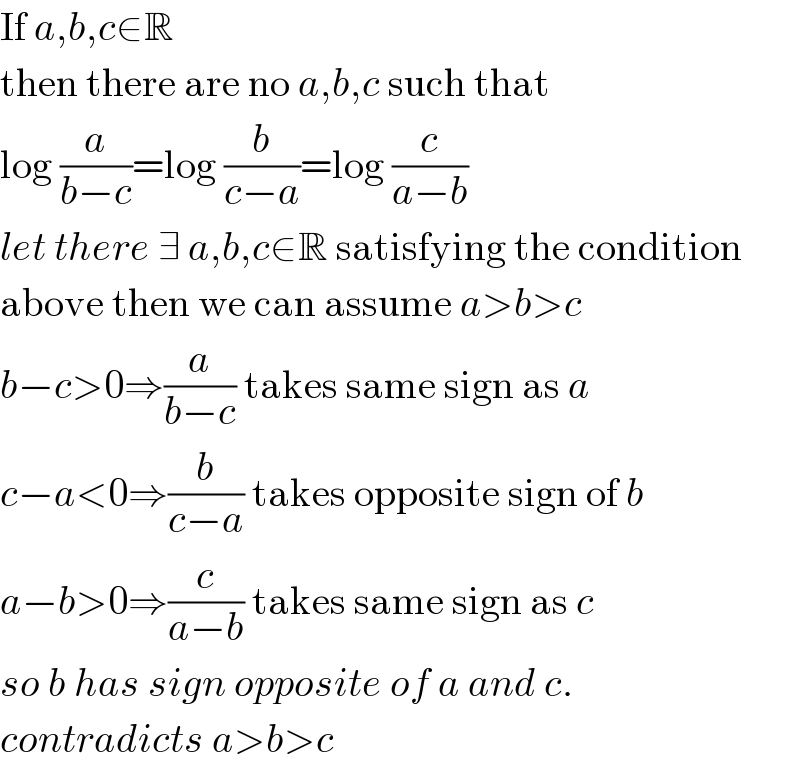
Question Number 6346 by sanusihammed last updated on 24/Jun/16

Commented by prakash jain last updated on 25/Jun/16

$$\mathrm{If}\:{a},{b},{c}\in\mathbb{R} \\ $$$$\mathrm{then}\:\mathrm{there}\:\mathrm{are}\:\mathrm{no}\:{a},{b},{c}\:\mathrm{such}\:\mathrm{that} \\ $$$$\mathrm{log}\:\frac{{a}}{{b}−{c}}=\mathrm{log}\:\frac{{b}}{{c}−{a}}=\mathrm{log}\:\frac{{c}}{{a}−{b}} \\ $$$${let}\:{there}\:\exists\:{a},{b},{c}\in\mathbb{R}\:\mathrm{satisfying}\:\mathrm{the}\:\mathrm{condition} \\ $$$$\mathrm{above}\:\mathrm{then}\:\mathrm{we}\:\mathrm{can}\:\mathrm{assume}\:{a}>{b}>{c} \\ $$$${b}−{c}>\mathrm{0}\Rightarrow\frac{{a}}{{b}−{c}}\:\mathrm{takes}\:\mathrm{same}\:\mathrm{sign}\:\mathrm{as}\:{a} \\ $$$${c}−{a}<\mathrm{0}\Rightarrow\frac{{b}}{{c}−{a}}\:\mathrm{takes}\:\mathrm{opposite}\:\mathrm{sign}\:\mathrm{of}\:{b} \\ $$$${a}−{b}>\mathrm{0}\Rightarrow\frac{{c}}{{a}−{b}}\:\mathrm{takes}\:\mathrm{same}\:\mathrm{sign}\:\mathrm{as}\:{c} \\ $$$${so}\:{b}\:{has}\:{sign}\:{opposite}\:{of}\:{a}\:{and}\:{c}. \\ $$$${contradicts}\:{a}>{b}>{c} \\ $$
Commented by nburiburu last updated on 24/Jun/16
![I believe this situation cannot be met. let asume a>b>c then as it says log[x] ⇒ x>0 for any real number. however: (a/(b−c))>0 ∧ (b/(c−a))>0 ∧ (c/(a−b))>0 is impossible if a>b>c then c−a<0 then b<0 and c<0 but if that case would be true then (c/(a−b))<0 which contradicts the situation Maybe in complex numbers could be met.](Q6352.png)
$${I}\:{believe}\:{this}\:{situation}\:{cannot}\:{be}\:{met}. \\ $$$${let}\:{asume}\:{a}>{b}>{c}\:{then}\:{as}\:{it}\:{says}\: \\ $$$${log}\left[{x}\right]\:\Rightarrow\:{x}>\mathrm{0}\:{for}\:{any}\:{real}\:{number}. \\ $$$${however}: \\ $$$$\frac{{a}}{{b}−{c}}>\mathrm{0}\:\wedge\:\frac{{b}}{{c}−{a}}>\mathrm{0}\:\wedge\:\frac{{c}}{{a}−{b}}>\mathrm{0}\:\:{is}\:{impossible} \\ $$$${if}\:{a}>{b}>{c}\:{then}\:{c}−{a}<\mathrm{0}\:{then}\:{b}<\mathrm{0}\:{and}\:{c}<\mathrm{0} \\ $$$${but}\:{if}\:{that}\:{case}\:{would}\:{be}\:{true}\:{then}\:\frac{{c}}{{a}−{b}}<\mathrm{0}\:{which}\:{contradicts}\:{the}\:{situation} \\ $$$${Maybe}\:{in}\:{complex}\:{numbers}\:{could}\:{be}\:{met}. \\ $$
Commented by sanusihammed last updated on 25/Jun/16

$${Thanks} \\ $$
